Traditional college education overshadows career development
February 8, 2019
As students feel pressure to attend college, their motivation declines as they envision the debt ahead.
A college education is often seen as the most glamorous path after high school, and choices such as the military or trade school can be overlooked. Ultimately, the decision comes down to personal preference.
It’s a fact that a college education can improve daily life.
According to a 2015 report from the U.S. Department of Education, a worker with a bachelor’s degree will earn approximately $1 million more throughout their life than a worker without post secondary education. 75% of home buyers in 2016 were college-educated, as shown in a report from Zillow.
However, college may be unrealistic for some people who do not have the financial means for tuition.
According to ProCon.org, 44 million Americans owed more than $1.5 trillion from student loans as of May 2018.
“Most students want a stable, life fulfilling career, and to not have to worry about money. College is not always to best way to get to those goals,” said guidance counselor Joanna Buonviri.
Some people see trade schools as more practical options, as they cost about $100,000 less than a four-year college. They teach specific skills in a certain job area, provide hands-on experience, and also set up a path straight to a job when certification is acquired.
“The program helps me learn something that I’m actually interested in. The environment with the teacher and students makes the material easier and more interesting to learn,” said junior ACT student Micah Johnson.
The military is an alternative, as it teaches specific skills. The military provides advanced, technical training in specific fields, improves leadership skills, work ethic, and a sense of duty and honor. They provide full healthcare benefits and travel opportunities all over the world.
Once enlisted, the pay starts at around $20,000 with benefits and grows each year, with a full pension for retirees.
“The military greatly helped me mature and prepared me for college. It gave me a direction in life, and I would do it all over again if I had the choice,” said science teacher and Navy veteran David Lehan.
As graduation nears for high school students, they make a decision that impacts the rest of their lives.
“There was a time when having a college degree meant that you were almost guaranteed a lucrative career. That is not the case now. Work ethic, the ability to solve problems, and the ability to build relationships are the keys to success,” said Buonviri.
No choice is without flaws. College, trade school, and the military all have downsides, and they can not be ranked, because it is a personal decision for students to make.
“I think it is important for students to picture what they want their lives to look like as an adult and then work backwards from there,” said Buonviri.


